100+ Anti-Inflammatory Foods List PDF [Ultimate Guide]
Creating a simple, effective anti-inflammatory diet doesn’t require exotic ingredients or complex recipes. Many inflammation-fighting foods are likely staples in your pantry or fridge already!
Our dietitian recommended anti-inflammatory foods list pdf simplifies your options and guides you toward making healthy, flavorful dietary choices.
I’ve created an easy-to-navigate pdf list of dietitian recommended anti-inflammatory foods, featuring over 100 anti-inflammatory foods, for anyone aiming to improve their health and fitness by keeping inflammation at bay.
I recommend that before your next grocery store trip, print out this pdf list of anti inflammatory foods and circle your favorites or new foods you want to try.
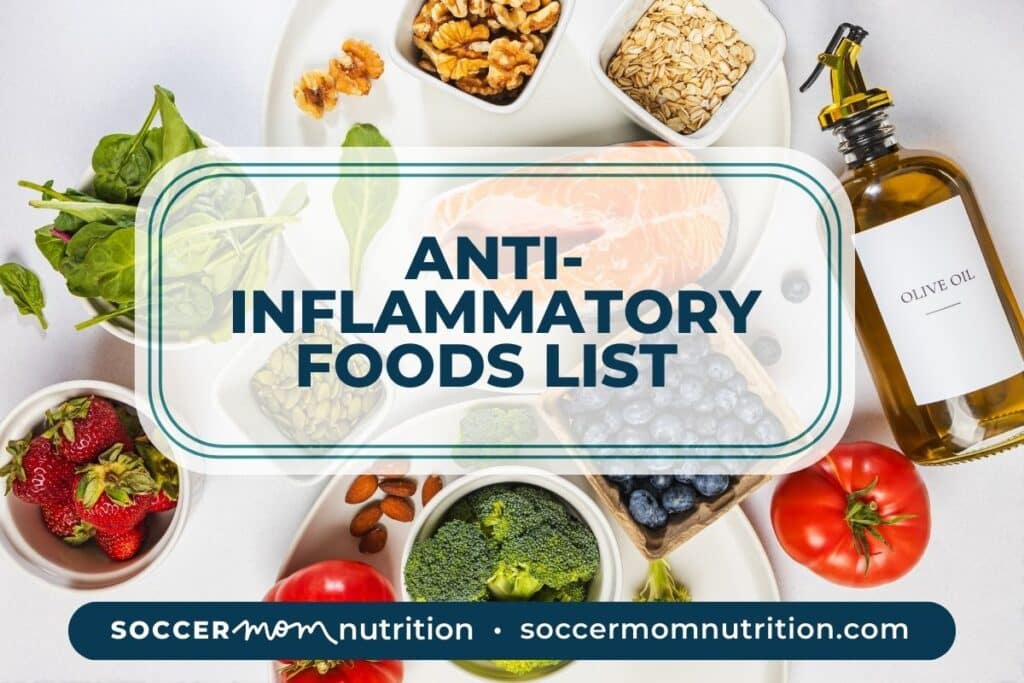
Anti-inflammatory foods list
Our anti-inflammatory foods list pdf is your handy tool to making healthier food choices. With over 100 foods listed, you’ll have a wide variety of options to incorporate into your meals and snacks.
Not surprisingly, the anti inflammatory food list pdf contains many commonly eaten foods, and probably some you’ll find in your own pantry or fridge.
For instance, oatmeal is an anti-inflammatory food. Fruits and vegetables like pineapple, cucumber and sweet potatoes are good for reducing inflammation. And even spices like cinnamon have anti-inflammatory effects.
This tool is perfect for anyone looking to:
- Reduce inflammation naturally
- Improve overall health and wellness
- Discover new, healthy foods to enjoy
Below you’ll find a comprehensive anti-inflammatory diet food list for each food category. However, we recommend printing our anti-inflammatory foods list pdf because it lists all the foods on one page.
Fruits
Fruits are rich in anti-inflammatory rich antioxidants, especially vitamin C, which can help reduce inflammation and boost your immune system.
Some fruits also contain other anti-inflammatory compounds, such as bromelain in pineapple, quercetin in apples, and anthocyanins in berries.
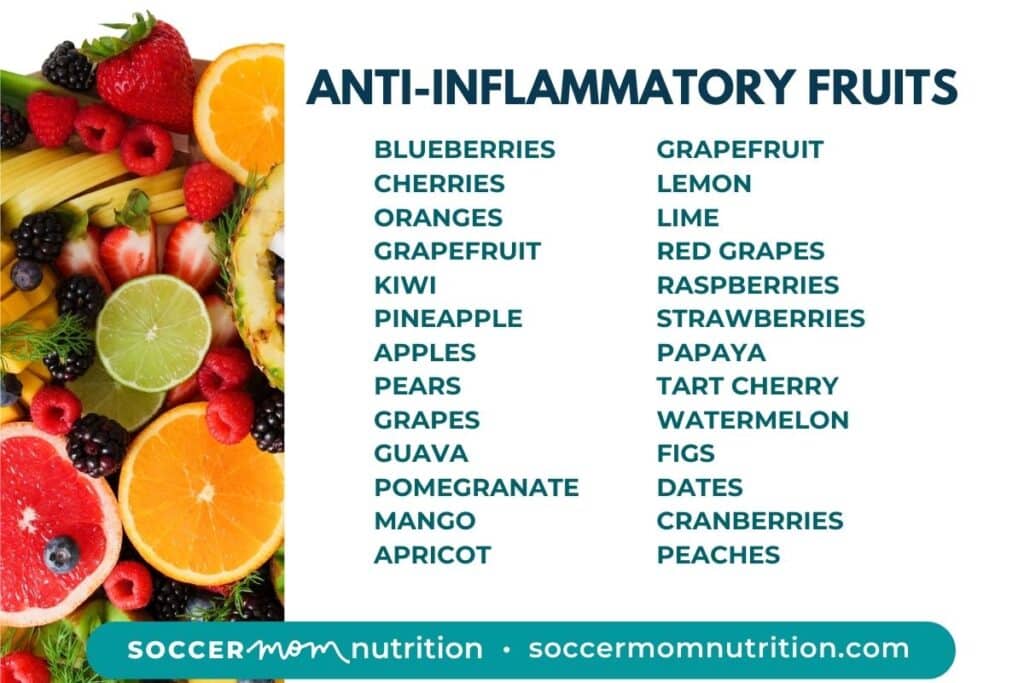
Some of the best anti-inflammatory fruits are:
- Blueberries
- Cherries
- Oranges
- Grapefruit
- Kiwi
- Pineapple
- Apples
- Pears
- Grapes
- Guava
- Pomegranate
- Mango
- Apricot
- Grapefruit
- Lemon
- Lime
- Red grapes
- Raspberries
- Strawberries
- Papaya
- Tart Cherry
- Watermelon
- Figs
- Dates
- Cranberries
- Peaches
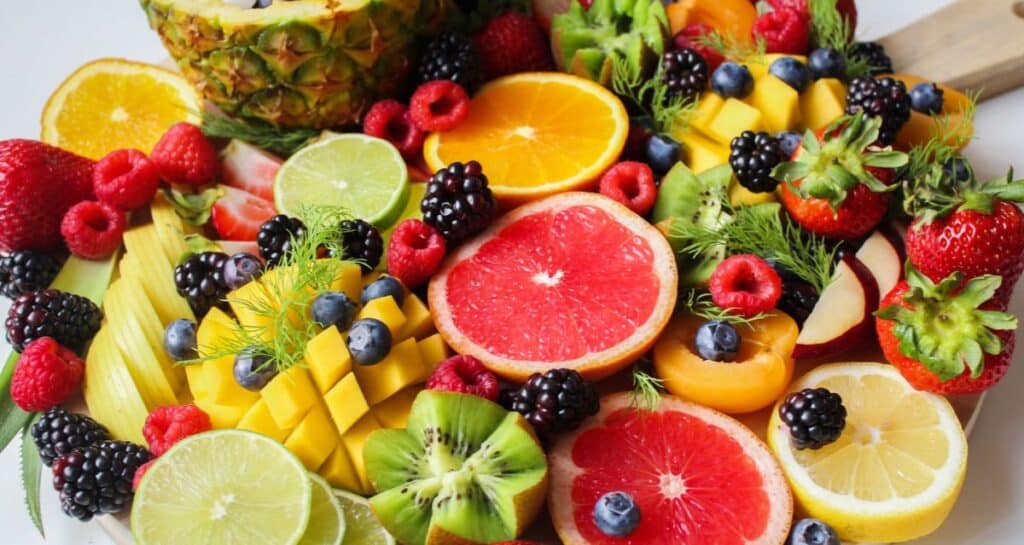
Vegetables
Vegetables are also high in antioxidants, especially vitamin A, which can help reduce inflammation and protect your skin and eyes.
Some vegetables also contain other anti-inflammatory compounds, such as sulforaphane in broccoli, curcumin in turmeric, and allicin in garlic.
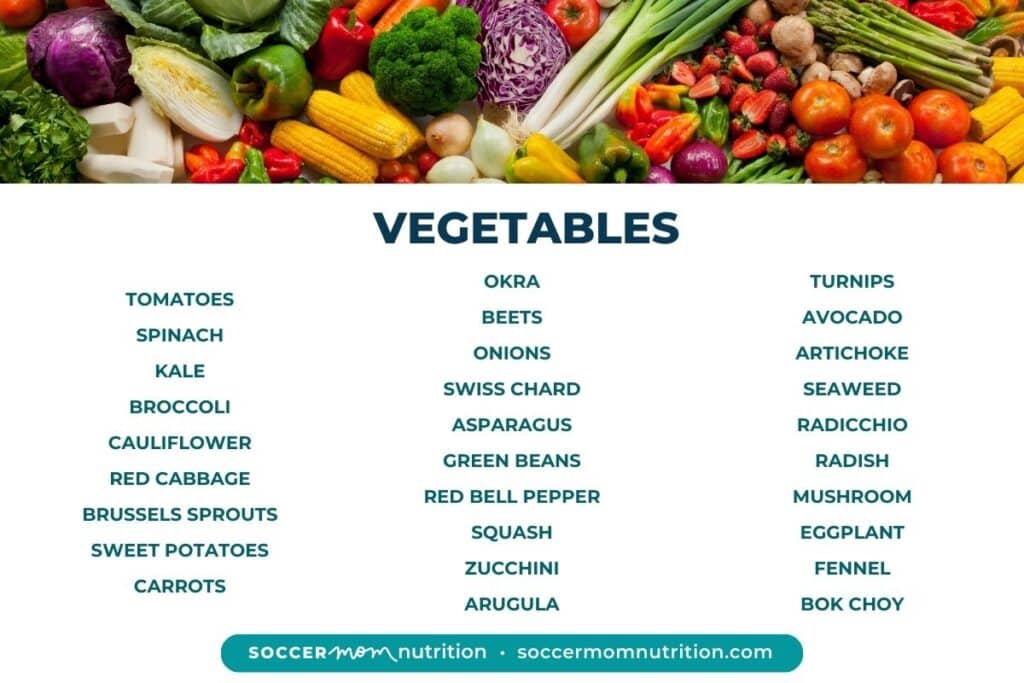
Some of the best anti-inflammatory vegetables are:
- Tomatoes
- Spinach
- Kale
- Broccoli
- Cauliflower
- Red cabbage
- Brussels sprouts
- Sweet potatoes
- Carrots
- Okra
- Beets
- Onions
- Swiss Chard
- Asparagus
- Green Beans
- Red Bell pepper
- Squash
- Zucchini
- Arugula
- Turnips
- Avocado
- Artichoke
- Seaweed
- Radicchio
- Radish
- Mushroom
- Eggplant
- Fennel
- Bok choy
- Cucumber
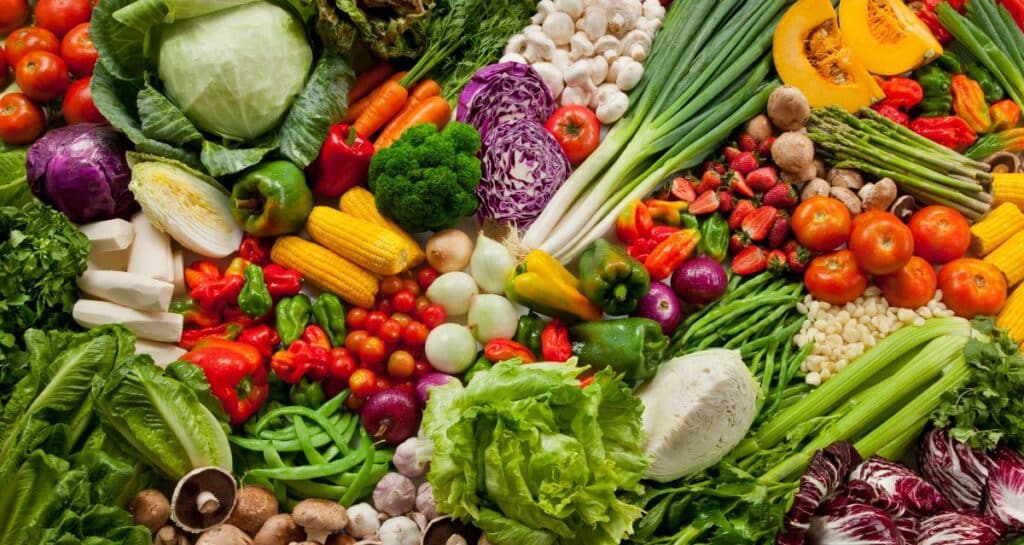
Grains
Grains are a good source of fiber, which can help lower inflammation by improving your gut health and lowering your cholesterol and blood sugar levels.
They also contain other anti-inflammatory compounds, such as beta-glucan in oatmeal, lignans in flaxseeds, and polyphenols in buckwheat.
Some of the best anti-inflammatory grains are:
- Brown Rice
- Barley
- Farro
- Millet
- Oatmeal
- Quinoa
- Whole Wheat
- Buckwheat
- Spelt
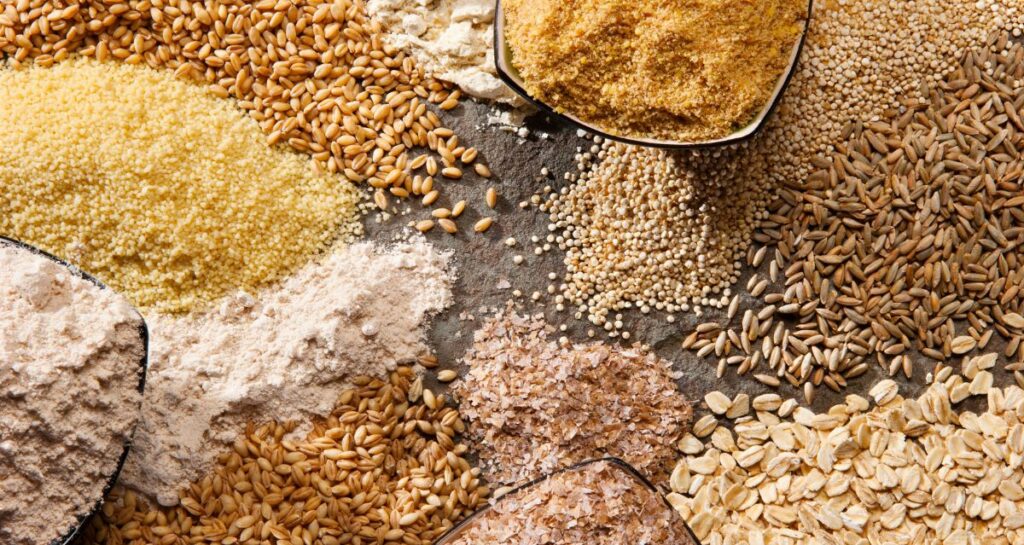
Spices
Spices are not only great for adding flavor to your dishes, but also for adding antioxidants and anti-inflammatory compounds to your diet.
Other health benefits from spices include improving your digestion, metabolism, and blood circulation.
Some of the best anti-inflammatory spices are:
- Garlic
- Ginger
- Turmeric
- Cinnamon
- Rosemary
- Saffron
- Thyme
- Sage
- Oregano
- Black pepper
- Parsley
- Pepper
- Nutmeg
- Cloves
- Cumin
- Basil
- Dill
- Cinnamon
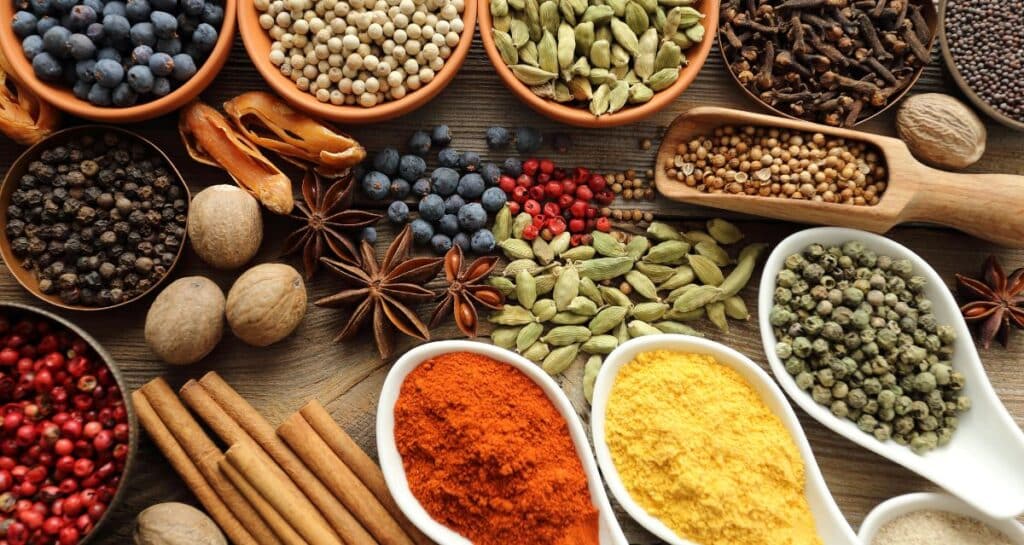
Nuts and Seeds
Nuts and seeds are a good source of healthy fats, especially omega-3 fatty acids, which can help reduce inflammation and improve your brain and heart health.
Also, nuts and seeds contain other anti-inflammatory compounds, such as vitamin E in almonds, resveratrol in peanuts, and lignans in sesame seeds.
Some of the best anti-inflammatory nuts and seeds are:
- Walnuts
- Almonds
- Cashews
- Pistachios
- Chia seeds
- Pumpkin seeds
- Brazil nuts
- Hazelnuts
- Macadamia nuts
- Sunflower seeds
- Sesame Seeds
- Flaxseeds
- Pecans
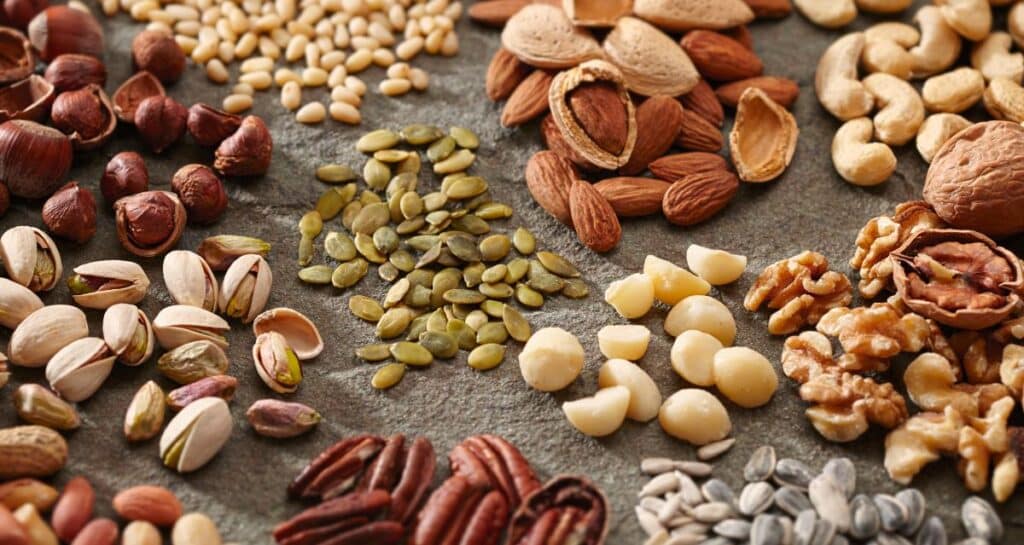
Fatty fish (omega 3)
Fatty fish are one of the best sources of omega-3 fatty acids, which can help reduce inflammation and improve your brain and heart health.
Omega-3 fatty acids can also help regulate your immune system and reduce the production of inflammatory cytokines.
In addition, some fatty fish also contain other anti-inflammatory compounds, such as astaxanthin in salmon, selenium in tuna, and iodine in cod.
Some of the best anti-inflammatory fatty fish are:
- Salmon
- Tuna
- Sardines
- Herring
- Cod
- Trout
- Shrimp
- Mackerel
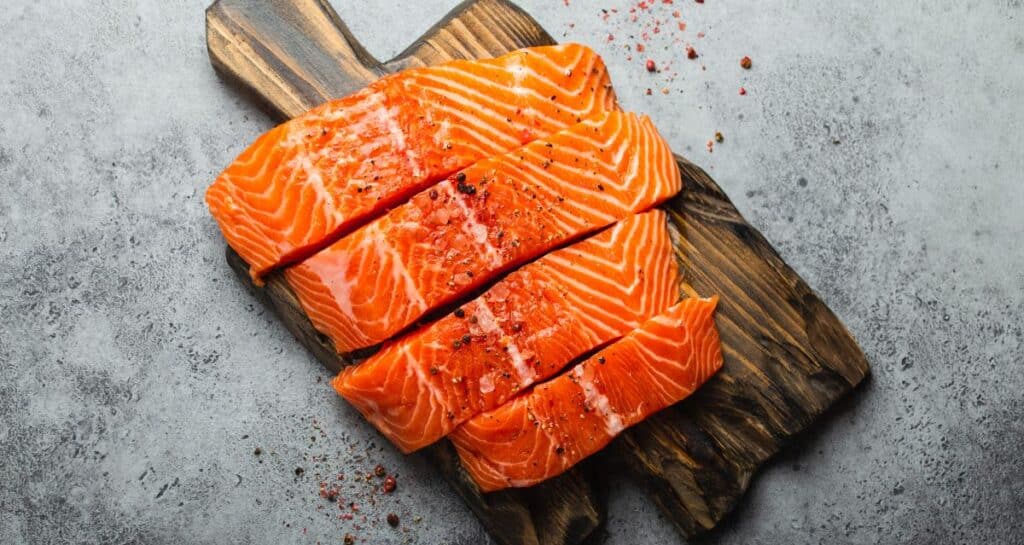
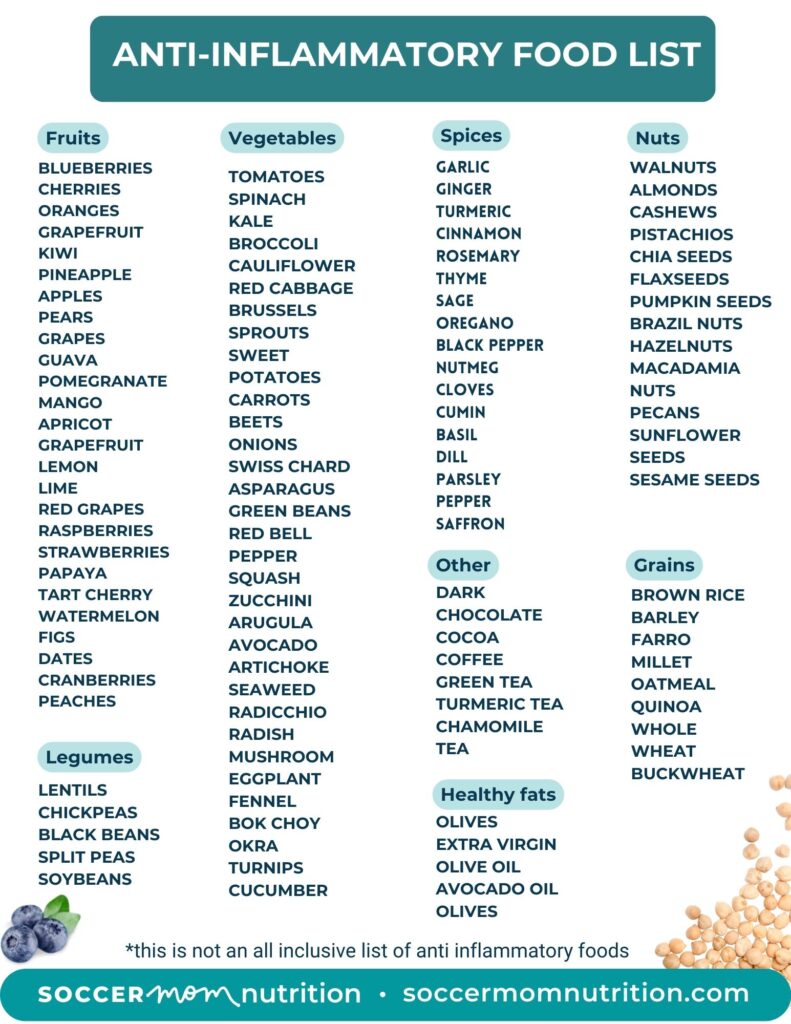
Dairy products
Dairy products have calcium, which helps protect your gut from oxidative damage by binding to bile acids and free fatty acids.
They also have dairy fat, which has some fatty acids that may lower inflammation, such as CLA and palmitoleic acid, butyric acid, phytanic acid, and α-linolenic acid.
Some anti-inflammatory dairy options include:
- Skim, 1%, 2% milk
- Cream
- Low fat ice cream
- Low fat yogurt
- Cream cheese
- Other low and high fat cheeses
- Low fat cottage cheese
- Ricotta cheese
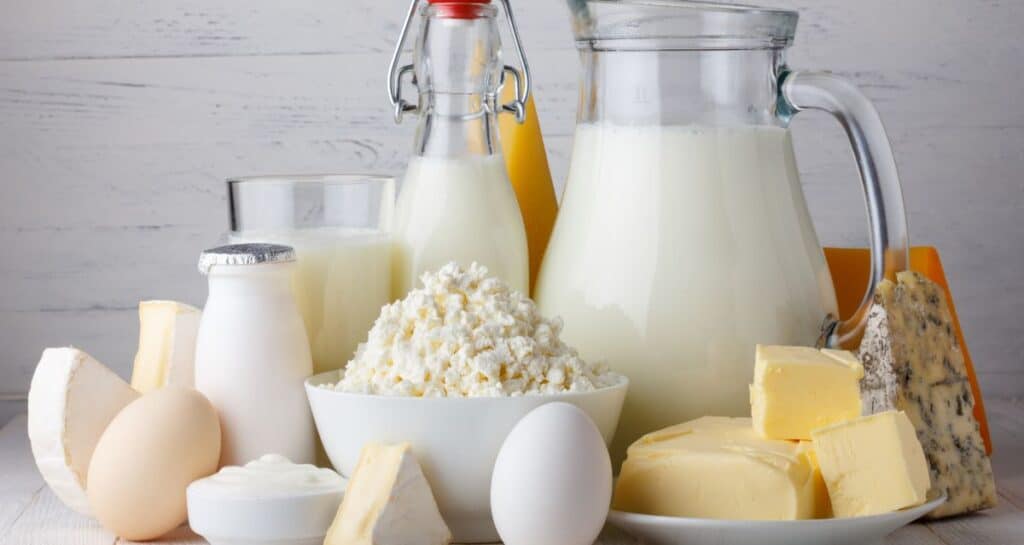
Other anti inflammatory foods
There are some other foods that have anti-inflammatory properties, such as dark chocolate, cocoa, coffee, green tea, turmeric tea, and chamomile tea.
These foods contain antioxidants and other compounds that can help reduce inflammation and improve your mood, energy, and cognitive function.
Some of the best other anti-inflammatory foods are:
- Dark chocolate
- Cocoa
- Coffee
- Green tea
- Turmeric tea
- Chamomile tea
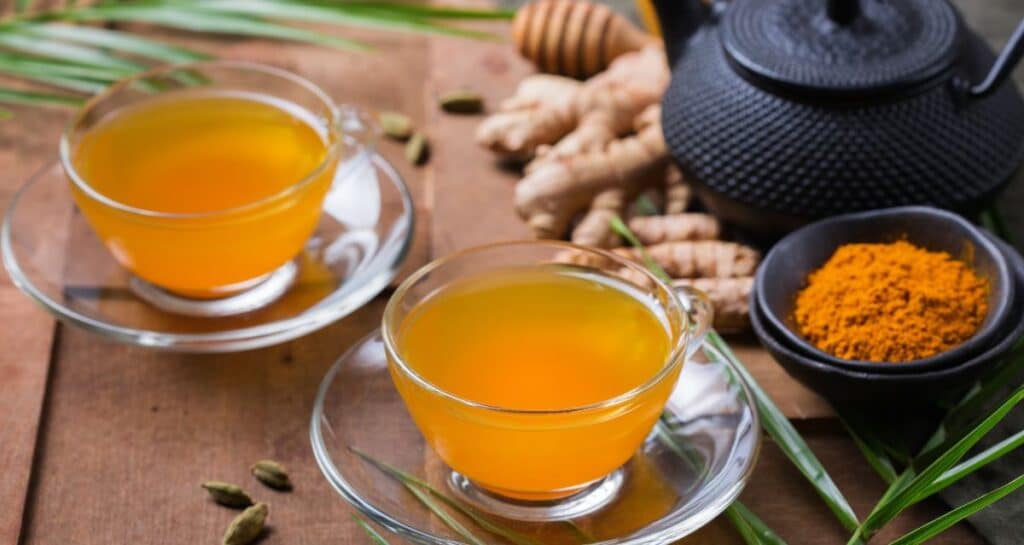
10 best inflammation fighting foods
Ten of the best foods that naturally fight inflammation are berries, fatty fish, leafy greens, turmeric, olive oil, nuts, ginger, tomatoes, garlic and dark chocolate.
Read more about each of these super foods below:
- Berries: Berries like blueberries, strawberries, raspberries and blackberries are packed with antioxidants called anthocyanins. Research shows these reduce inflammation in the body.
- Fatty fish: Fatty fish like salmon, sardines, and mackerel are rich in omega-3 fatty acids, which have anti-inflammatory properties.
- Leafy greens: Leafy greens like spinach, kale, and collard greens have nutrients like vitamins A, C, and K, as well as antioxidants and anti inflammatory compounds.
- Turmeric: Turmeric, a spice that contains a compound called curcumin, is used in cooking to enhance flavors and for its anti-inflammatory properties.
- Olive oil: Extra virgin olive oil is a rich source of healthy fats and antioxidants. Indeed, it also includes a compound called oleocanthal, shown to have anti-inflammatory effects similar to ibuprofen.
- Nuts: Nuts like almonds, walnuts and pistachios have healthy fats, fiber, and antioxidants like flavanoids that reduce inflammation.
- Ginger: Ginger contains compounds called gingerols and shogaols, which have anti-inflammatory and antioxidant properties.
- Tomatoes: Tomatoes are rich in lycopene, an antioxidant that has been shown to reduce inflammation in the body. They also contain other anti-inflammatory compounds like beta-carotene and vitamin C.
- Garlic: Garlic contains compounds like allicin and sulfur, which have an anti-inflammatory and immune-boosting effects.
- Dark chocolate: Dark chocolate is high in flavonoids, antioxidants that have anti inflammatory benefits.
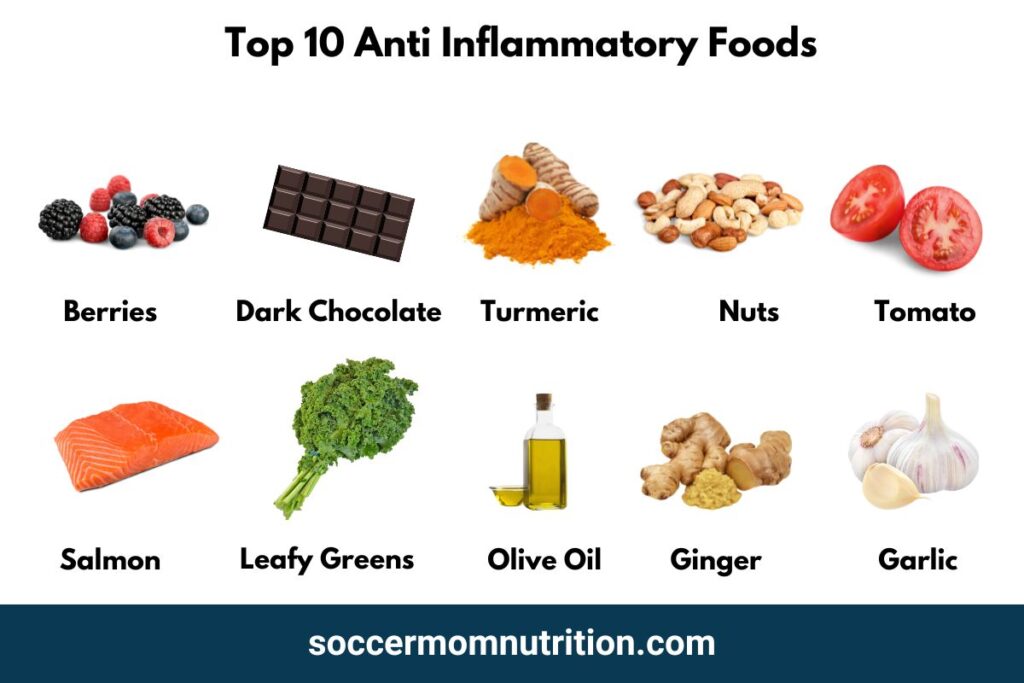
Incorporating Anti-Inflammatory Foods into Your Diet
Now that you know what foods to look for, here are some tips on how to incorporate them into your daily meals:
- Start with breakfast: Begin your day with oatmeal topped with berries and nuts for a delicious, anti-inflammatory boost.
- Make smart swaps: Choose whole grains over processed ones and opt for leafy greens as a base for your salads.
- Snack wisely: Keep nuts and seeds on hand for easy, healthy snacking.
- Fish Fridays: Incorporate fatty fish into your diet at least twice a week for a dose of omega-3s.
- Spice things up: Add turmeric, ginger, and cinnamon to your cooking to not only enhance flavor but also gain their anti-inflammatory benefits.
Understanding inflammation
First, let’s break down what inflammation really is. Think of inflammation as your body’s first line of defense against injury, infection, or illness. It’s a natural process that helps your body heal.
However, when inflammation becomes chronic, it’s like your body’s defense system is always on, which can lead to health problems like heart disease, arthritis, and more.
Chronic inflammation contributes to a range of health issues that can impact anyone’s overall health and well being. For athletes, I see impacts on performance, recovery, and inability to perform optimally.
This is where the importance of dietary choices comes into play.
Learn how to add anti inflammatory foods to your diet with our Ultimate Guide on Anti-Inflammatory Foods that has a dietitian created anti-inflammatory meal plan, shopping list, and our anti-inflammatory foods list pdf.
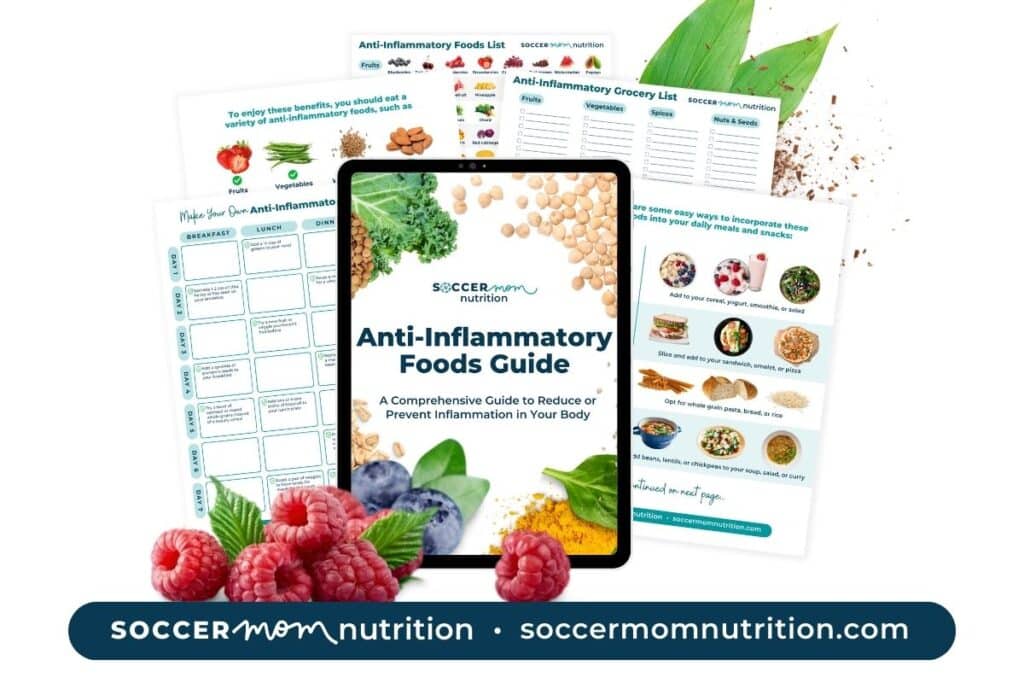
The importance of anti-inflammatory foods
Eating a diet rich in anti-inflammatory foods helps keep your body’s defense system in check.
This means you’re not just helping reduce the risk of chronic diseases, but you’re also boosting your energy, improving your mood, and possibly speeding up recovery times from games, practices, workouts or injuries.
By including anti-inflammatory foods in most meals and snacks you increase the amount of antioxidants you’re eating to heal inflammation and improve overall health.
It’s best to eat a variety of anti-inflammatory foods to maximize the benefits.
Another benefit of anti-inflammaory foods is that they also tend to be high in fiber and other vitamins and minerals which have many other overall health benefits.
Do athletes need anti-inflammatory foods?
Since athletes may have increased inflammation from exercise our ultimate guide, anti-inflammatory foods list pdf, is packed with inflammation fighting antioxidants, vitamins and minerals.
Our list of anti-inflammatory foods pdf helps you to make healthy choices to support your sports performance, nutrition for recovery after exercise and your overall health and well being.
Final thoughts
The foods on the anti-inflammatory foods list pdf have many health benefits because of the antioxidants, fiber and other minerals. With so many foods on this list, you should have no problem adding them to your meals.
From nutrient and fiber rich fruits and vegetables, whole grains, healthy fats and protein sources, this free anti-inflammatory foods list pdf printable is your go to source for choosing foods to support your every day diet and sports nutrition performance plan.
Join our mailing list and get our FREE Pre-Activity Fueling Guide.
*While this is a list of over 100 anti inflammatory foods, this is not all inclusive.*
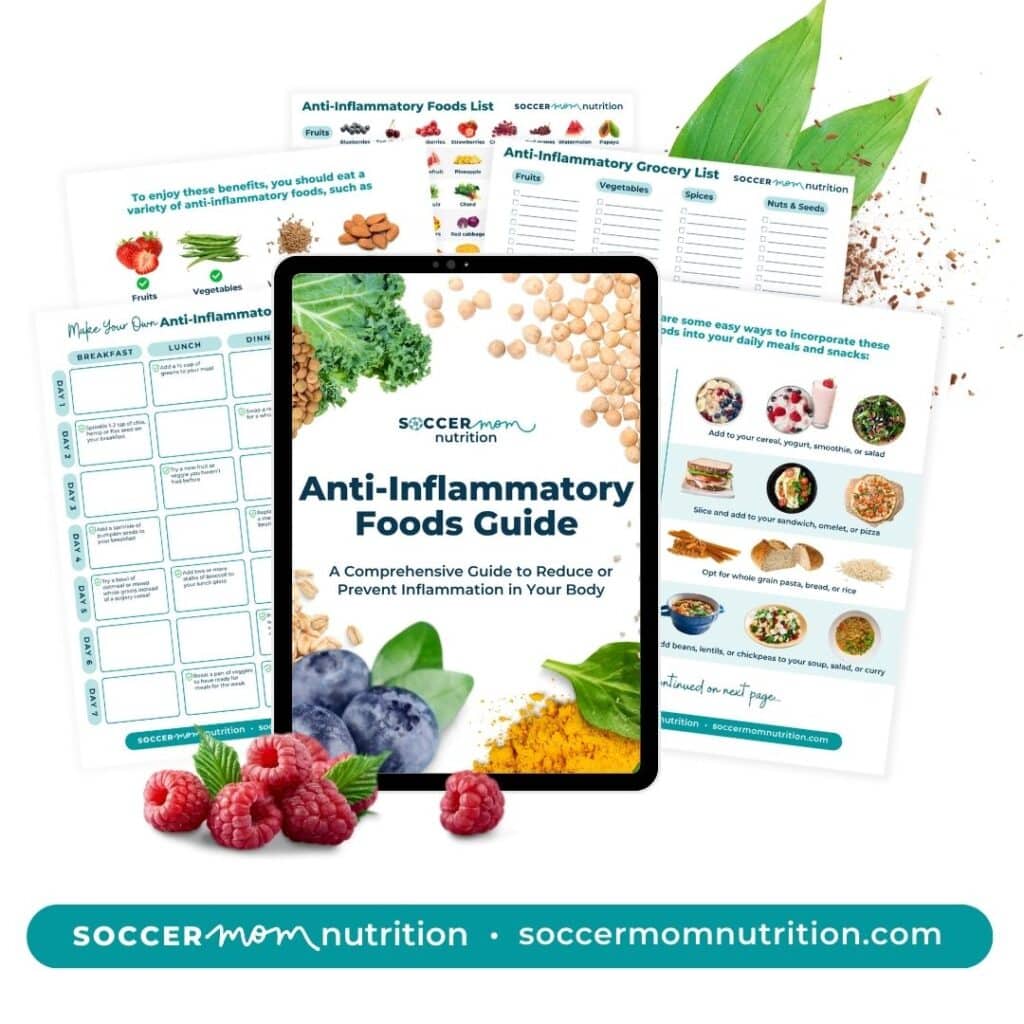
Stephanie Magill, MS, RD, CD, FAND has over 22 years of experience in public health and nutrition. As a performance registered dietitian nutritionist, Stephanie specializes in sports nutrition and provides simple and actionable information so that athletes can be well fueled for high performance on and off the field. Stephanie has a Master’s Degree in Nutrition and is a Fellow of the Academy of Nutrition and Dietetics.

